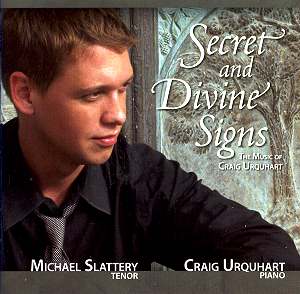In any response to
the music of Craig Urquhart, it seems
unavoidable that one should mention
his connections with Leonard Bernstein.
Born and brought up
in Michigan, Urquhart moved to New York
City after gaining a Master’s in Composition
at the University of Michigan; he left
some of his music with the doorman at
the Dakota, where Bernstein lived, in
hopes that the maestro would look at
it. He did, liked it, and invited the
young composer to one of his concerts.
In 1985 Urquhart became Bernstein’s
P.A. and continued to act as such until
Bernstein’s death in 1990. To this day,
Urquhart composes at a Bösendorfer
grand formerly owned by Bernstein.
If Urquhart’s own music
has any affinity with Bernstein’s it
perhaps resides in its refusal to be
bound by conventional generic and stylistic
boundaries. In another sense, Bernstein
was clearly an important influence,
responsible for giving Urquhart the
necessary confidence to be true to himself
as a composer. In an interview
with Kathy Parsons Urquhart gives the
following account of an early conversation
with Bernstein:
"Lenny said, ‘There
seem to be two people here. There is
somebody who writes beautiful songs,
and there is somebody who writes this
twelve-tone stuff.’ My secret was out!
I couldn’t hide my real musical language
from him. He said, ‘You really need
to write from the heart, and not from
the head.’ I had done all of the academic
work – 12 tone, atonal, music where
you draw cards and everyone improvises
– and things like that, so I went back
to the music that I wrote as a child,
and went into the harmonic languages
there. That’s what I built my music
on after that – that sense of childhood
tonality that I had."
The resulting idiom
is often beautiful but is emotionally
somewhat narrow. It occupies a territory
which borders on one side on, say, Chopin,
Debussy, Satie and perhaps the Koechlin
of Les Heures Persanes and on
the other such New Age piano work as
that of Phil Aaberg or George Winston.
The music is graceful, often imbued
with an inner melancholy, largely devoid
of major climaxes, with frequent silences
allowing notes and phrases space to
resonate.
Though the major emphasis
here is on Urquhart the song-writer,
the CD also contains five samples of
Urquhart’s solo piano music of which
several previous CDs have been issued
– e.g. Streamwalker, The Dream
of the Ancient Ones, Songs Without
Words, Epitaphs and Portraits
and Evocation. The piano pieces
are carefully integrated into the programme
– so that, for instance, the piano piece
‘Vesper Hymn’ prepares the ground harmonically
for the immediately ensuing song ‘Among
the Multitude’.
Individual songs by
Urquhart have already been recorded
by, for example, Thomas Hampson - on
his programme of Whitman settings, To
the Soul, on EMI - but this is the
first substantial selection to be recorded.
The songs recorded here include settings
of poems by Emily Dickinson (five),
Walt Whitman (four), D. H. Lawrence
(one), Herman Hesse (one) and the contemporary
American, Ron Draddy (one). All texts
are provided.
Urquhart’s settings
respect the rhythms and phrase structures
of the original poems, and his understanding
of his texts is everywhere evident.
Michael Slattery is a fine young tenor,
who has already made a very favourable
impression in the baroque repertoire.
Here he is recorded very close to the
microphone; the breathy sound which
results is entirely appropriate to the
intimacy which characterises these settings.
These are songs of great innerness,
not declamatory pieces; Slattery sings
with subtlety, sweetness of tone and
conviction. There is perhaps too much
similarity of theme and method for this
to be a CD which will regularly be listened
to from beginning to end, but dipped
into it offers some beautiful readings.
Love poems both of excitement and disillusionment,
anticipation and memory, receive well-judged
settings and accomplished performances,
and the results make for rewarding listening.
Glyn Pursglove


